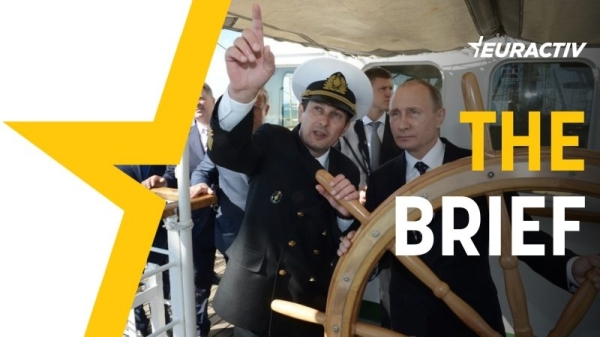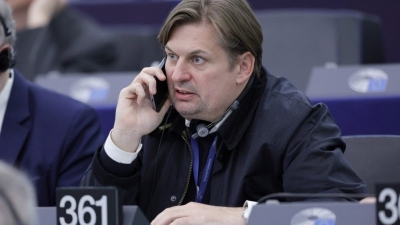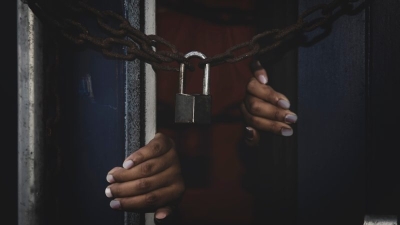The Brief — Putin’s lost seas

We don’t know if Vladimir Putin will ultimately be able to make territorial gains at the expense of Ukraine, but the Russian president has already irreversibly lost something more precious: the Baltic Sea and, to some extent, the Black Sea.
The Russian Federation, as we know, is the largest country on Earth, spanning eleven time zones across the Eurasian continent. Nevertheless, Russia, and especially its European territory, has minimal access to the sea.
To the south, it’s the Black Sea, a marginal sea linked to the Mediterranean via the Bosphorus and Dardanelles straits. In the North, it’s the Baltic Sea, another marginal sea connected to the North Sea via the Sweden-Denmark strait.
During the Cold War, the Baltic Sea was dubbed by the Soviet Union “the Sea of Peace”. The USSR and the Warsaw Pact were the masters of the southern shores of the Baltic, the coastal countries being the German Democratic Republic, Poland, and the USSR.
In the north, the coastal countries were two non-aligned countries, Sweden and Finland. Russia considered the neutral countries as its backyard and the Baltic as its internal lake.
Things look very different today.
By focusing on strengthening its presence in the Black Sea, with the annexation of Crimea in 2014 and the Russification of the Azov Sea, by occupying its Ukrainian shore in 2022, it looks like Russia lost more than it gained.
Today, the Baltic Sea has become NATO’s own pool. The GDR is consigned to history while Poland is in NATO, as are the former Soviet republics of Lithuania, Latvia, and Estonia. Even more importantly, Finland has joined NATO and Sweden is already treated as a NATO member.
According to a recent German study, in times of peace, Russia has a legitimate right to use vital sea lines of communication in the Baltic Sea to its territories.
But in the event of an armed conflict, that could change dramatically.
NATO would have great leverage if it wanted to impede Russia’s exclave of Kaliningrad and the access to St Petersburg, an economic lifeline for Russia, through blockades and military operations, or even to close these sea lines for Russian use.
We could also argue that even in the Black Sea, the Russian gains are controversial.
Before Russia illegally occupied and annexed Crimea, it had the option of using its military base of Sevastopol with a lease up to 2042 and prolonging it in successive five-year extensions.
More importantly, the Black Sea was a sea of peace.
In wartime, as required by the Montreux Treaty of 1936, which regulates maritime traffic through the Turkish Straits, if Turkey is not involved in the conflict, warships of the nations at war (meaning today’s Russia) may not pass through the Straits, except when returning to their base.
Do the Russian generals and admirals realise what their supreme commander has achieved with his reckless Ukrainian adventure and how much harm he has caused to their fatherland?
Of course they do. But in the Russian playbook, the unenviable situation in which Russia finds itself today means, for Putin’s supporters at least, that in the next episode, he will have his revenge.
It is possible that some of Russia’s military commanders don’t buy this narrative, also because they know firsthand what led to the loss of Russia’s flagship vessel Moskva in April 2022, or, in October 2022, to the severe damage to its successor, the frigate “Admiral Makarov”.
When a dictator loses the war he has started, he speaks of wonder weapons, and that’s precisely what Putin is doing. Even if it becomes clear that the so-called “unstoppable” and “perfect” weapon can be stopped.
Conversely, the US must be very happy to be able to test its anti-missile weapons in proper combat conditions.
We can assume that the pressure on Putin is becoming hard to bear, and his next moves can only be more unpredictable and more dangerous. This drama, or perhaps tragedy is likely to be played out in the Baltic Sea and the Black Sea.
The Roundup
Formal approval of the EU’s renewable energy directive has been postponed following a last-minute objection by Paris, which wants further “guarantees” on low-carbon hydrogen derived from nuclear power.
The new greenhouse gas emission reduction target for transport fuels under the updated Renewable Energy Directive could reduce the amount of crop-based biofuels used in German road transport if implemented strictly, biofuel producers say.
Ukraine said “unprecedented” air attacks had rocked its capital and other areas early on Thursday, a day after it reached an agreement with Russia to extend a deal allowing grain exports across the Black Sea.
Turkey’s opposition leader vowed on Thursday to send back millions of migrants in a strident message aimed at winning the backing of an ultra-nationalist who helped push last weekend’s presidential vote to a runoff.
Look out for….
- G7 summit in Japan (Friday-Sunday), Commission President Ursula von der Leyen attending.
- Commissioner Paolo Gentiloni meets Portuguese Finance Minister Fernando Medina in Lisbon, takes part in Bilderberg Meetings.



